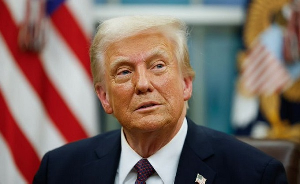Between 1973 and 1977, I had the opportunity to visit the UK three times on management training courses. It all happened during the National Redempttion Council regime of General Kutu Acheampong when foreign currency was scarce and its control quite tight.
On each occasion of my travel, besides the official foreign exchange arranged for me by my sponsors, I managed to acquire US100 Dollars (one hundred dollars) at the Ala Bar or Cow Lane.
In 1973, I exchanged US100 for 43 Pound Sterling in London. At Marks & Spencer I was able to shop for a decent pair of suit, a shirt and a nice pair of suede shoes. I was left with a small balance which I used to buy bits and pieces at the Petticoat Lane Sunday Market.
In 1974 when I next visited the UK, I changed US 100 Dollars for 41.8 Pound Sterling which could buy me only a jacket and nothing more. On my third visit which was in 1977, the same US 100 Dollars fetched me 58 Pound Sterling worth one good jacket. If I were to go to the UK today with US 100 Dollars in my pocket I would get about 63 Pound Sterling for it and this might afford me a very cheap jacket, certainly not one with the St. Michael’s label.
Ghana compared with Britain
Any Ghanaian reading this story would not fail to identify an economy buckling under devaluation of her currency and general inflation. That was exactly the experience Britain was going through and everywhere the conversation on every lip had to do with inflation. The names of the British Prime Minister Harold Wilson, and later, James Callaghan were being bashed. Receiving the most severe flak was Denis Healey the Chancellor of the Exchequer. They were blamed for the failure of most British industries, a weakening pound and rise in general cost of living, the same way some Ghanaians today do blame President Mahama and Hon. Seth Terkper.
One has to remember that it was the period when British oil industry needed a lot of infrastructure for expansion. She desperately had to do something to shore up the pound sterling to bolster investor confidence. The debate in Parliament was acrimonious. In fact, there was nearly division in the Labour Cabinet about which way to go. America provided a lifeline with a short-term loan of US 5.3 billion Dollars payable by December 1976. The terms were quite stiff.
Britain’s IMF bailout
By the time this facility was nearly fully drawn, the British economy had still not recovered to full health. The socialist Labour Government had to swallow their pride and ask for a loan of US 3.9 billion dollars from the International Monetary Fund (IMF) to shore up the pound sterling, generally revamp British industry and continue investing in oil infrastructure. The quantum of this loan was clearly beyond the lending capacity of the IMF and created a crisis which she could only surmount by borrowing from Germany and the US to be able to lend Britain that amount.
As should be expected, IMF demanded further 20 per cent cut in the British budget as “a conditionality” with dire consequences for social services. Of course the socialists in the Labour Government dissented. The Prime Minister Harold Wilson resigned.
The light at the end of the tunnel showed sooner than anticipated. The good investment in oil started yielding great dividends. With a boost in revenues, there was no need for Britain to draw all the IMF facility and the transaction ended by December 1977.
The resort to IMF for bailout has since produced an impact on British policy orientation away from full employment and social welfare and focus on control of inflation and expenditure. Additionally, it did prepare British minds for divestiture of state industries that had tended to be large, unwieldy and big money losers.
Lessons
Clearly, there are lessons here for Ghana; the British story is our story. When IMF Loan or any loan, be it Eurobond, or a grant is applied with focus and not just consumed in the form of salaries, it does yield good results. But one would need to ponder over the fates of social interventions such as LEAP and the form that National Health Insurance might take in the future.
PS: The British IMF Loan story told by Mr. Frazier in a layman’s language must end on a sad or heroic note. Denis Healey, whose doggedness as Chancellor of the Exchequer pulled Britain through her worst financial crisis, has died recently at the age of 98. In his obituary, he was hailed as the Prime Minister that Britain never had. How does Seth Tekper wish to be remembered?
frazierjoek@gmail.com
(Author: Blame not the Darkness; Akora; The Sissain Bridge)
Opinions of Monday, 26 October 2015
Columnist: Joe Frazier
The story of IMF Loan for UK, a lesson for Ghana
Entertainment














